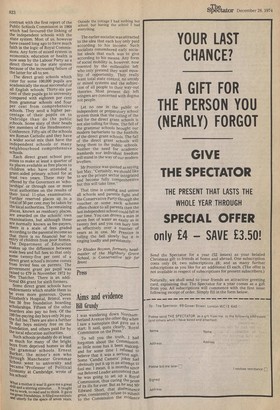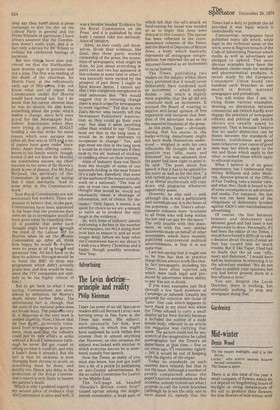Press Aims and evidence 13iti Grwly.
I was wandering down Northumberland Avenue the other day when I saw a nameplate that gave me a start: it said, quite clearly, 'Royal Commission on the Press.'
To tell you the truth hnagd, forgotten about the Commission, so little noise has It been m a k i and for some time I refused to believe that it was a serious sign. Some 'Candid Camera' Joker had obviously put it up in an attempt to fool me. I mean, it is months since out Beloved Leader announced h he was going to set up a Royal Commission, thus curing the press of its ills for ever. But as he and Mr Edward Short, that deserninence grise, consistently refuse to submit to the Commission the evidence they say they have-about a press campaign to dish the dirt on the Labour Party in general and the Prime Minister in particular; I have always assumed that the Commission doesn't really exist, and is in fact only a device for Mr Wilson to indulge his celebrated feelings of paranoia.
But two things have now convinced me that the Northumberland Avenue sign is genuine and not a joke. The first was reading of the death of the chairman, Sir Morris Finer, at the ridiculously early age of fifty-seltren. I-do not know what sort of report the Commission under Sir Morris would have turned out, but I do know that his career showed that he was no slouch. He also knew something about the press, which makes a change, since he'd once acted for the Newspaper Publishers' Association when they were trying to prevent SOGAT holding a one-day strike for some reason which now escapes me (after all, that was in 1970 an a lot of papers have gone under since then). Apart from offering condolences to his family which, though formal (I did not know Sir Morris) are nonetheless sincere, my chief reaction to the news of Sir Morris's death is one of dismay. For Mr Paul McQuail, the secretary of the Commission, is quoted as saying that it must inevitably "lead to some delay in the Commission's work."
Now Royal Commissions are not notoriously fast workers. There are reasons to believe that, in the past, Commissions have been appointed in the hope that the problems they were set up to investigate would all have gone away by reporting time. (It is possible that some such thought might have gone trough the mind of the Labour MP for Huyton when he set the ptesent Commission up. After all, think how happy he would Ere iNhere were no press at all tsi hoc and persecute him. All he'd have to do then to achieve Nirvaria-•-would be to force the BBC to drop any programme which didn't actually praise him, and that would be that, since the ITV companies are unlikely to be too highly critical of him.) But to get back to what I was saying. Commissions are slow, almost by definition. Sir Morris's death means further delay. The unfortunate. fact is, though, that the state of the national press does not brook delay. The patientris very ill. A diagnosis at the very least is needed urgently. Now, I know that Sir Don Ryder, so recently translated from newspapers to government, once said .that the industry could put its own affairs in order without a Royal Commission (although he never did get round to telling us what it could do, and why it hadn't done it already). But the fact is that its sickness is now changing from chronic to acute, so something must be done, and quickly too. Hence, any delay in the production of the Royal Commission's report is only likely to hasten the patient's death.
Which is why I grabbed eagerly at my second piece of evidence that the Commission is alive and well. It was a booklet headed 'Evidence for the Royal Commission on the Press,' and it is published by that body I cannot take too seriously, Aims of Industry.
'Aims,' as they cosily call themselves, divide their evidence, like Gaul, into three parts: worker censorship of the press; the economics of newspapers; what might be done. As just about everything in parts one and two has appeared in this column at some time or other I was naturally more excited by the prospect of part three. I ought to have known better. I cannot say that 1 was completely enraptured to read sentences like: "We would suggest that in initiating change there is much scope for newspapers to work together." Tell that to the Daily Mirror, who recently left the Newspaper Publishers' Association, so they could go their own way. Nor does it seem anything other than wishful to say "Unions must see that in the long term it would be in their interests to co-operate in change." Yes, and pigs must see that in the long term it would be in their interests if they took to the air, instead of sticking to toddling about on their trotters.
Aims of Industry does not flinch from the thought of some, of our nationals folding in the near future (it's a safe bet, therefore, that none of the authors of the report actually work on a national): "The loss of one, or even two, newspapers, sad thought that would be, would not . necessarily mean a shortage of information, not of choice, for the reader." Only Japan, it seems, is as spoilt for choice as we are, a remark so narve as to produce the only laugh in the evidence.
So, with Aims of Industry almost welcoming a decline in the number of newspapers, the NGA doing their level best to ensure it, and an even longer delay before we hear what the Commission has to say about it I wish you a Merry Christmas and a happy, though possibly newsless, New Year.















































 Previous page
Previous page